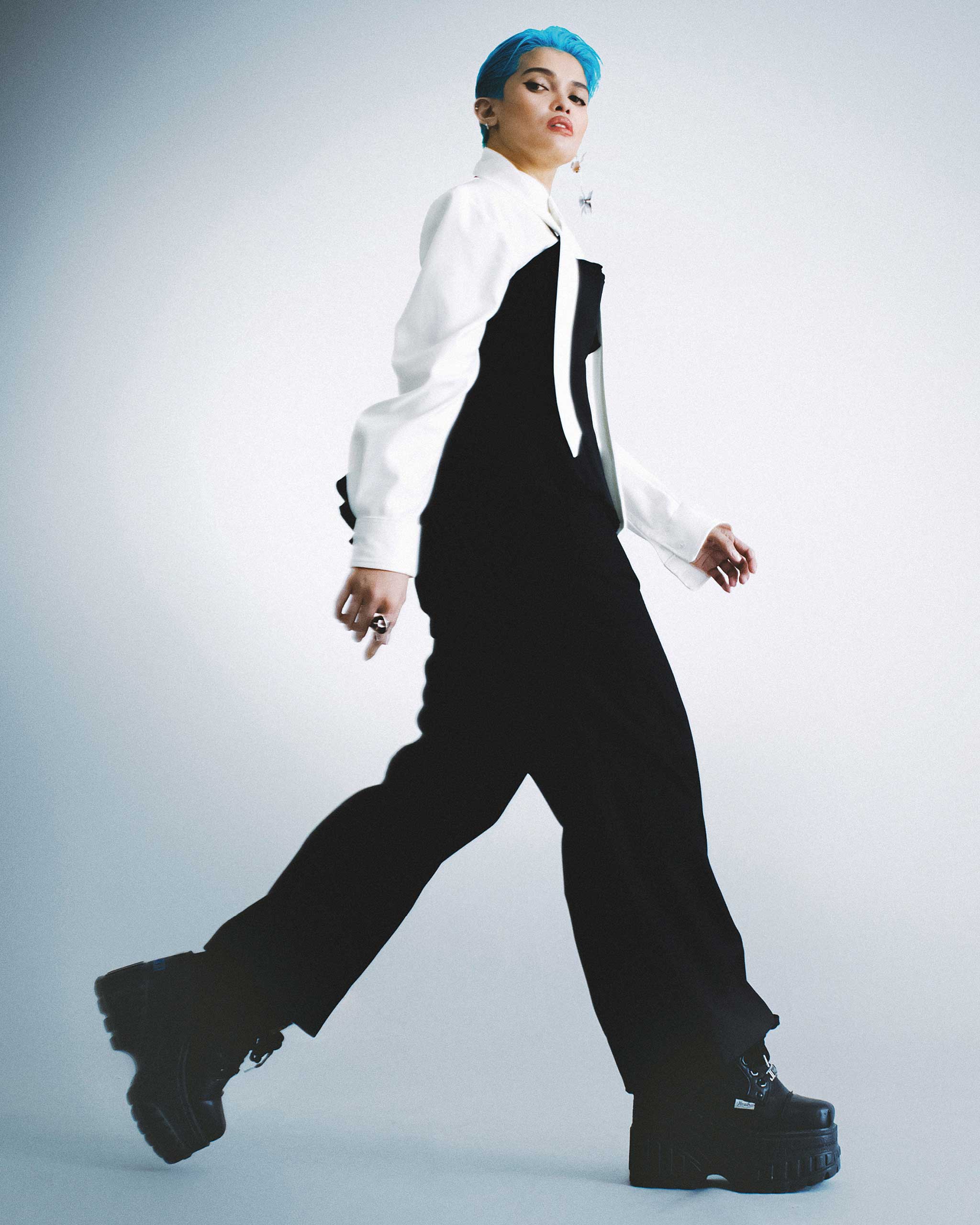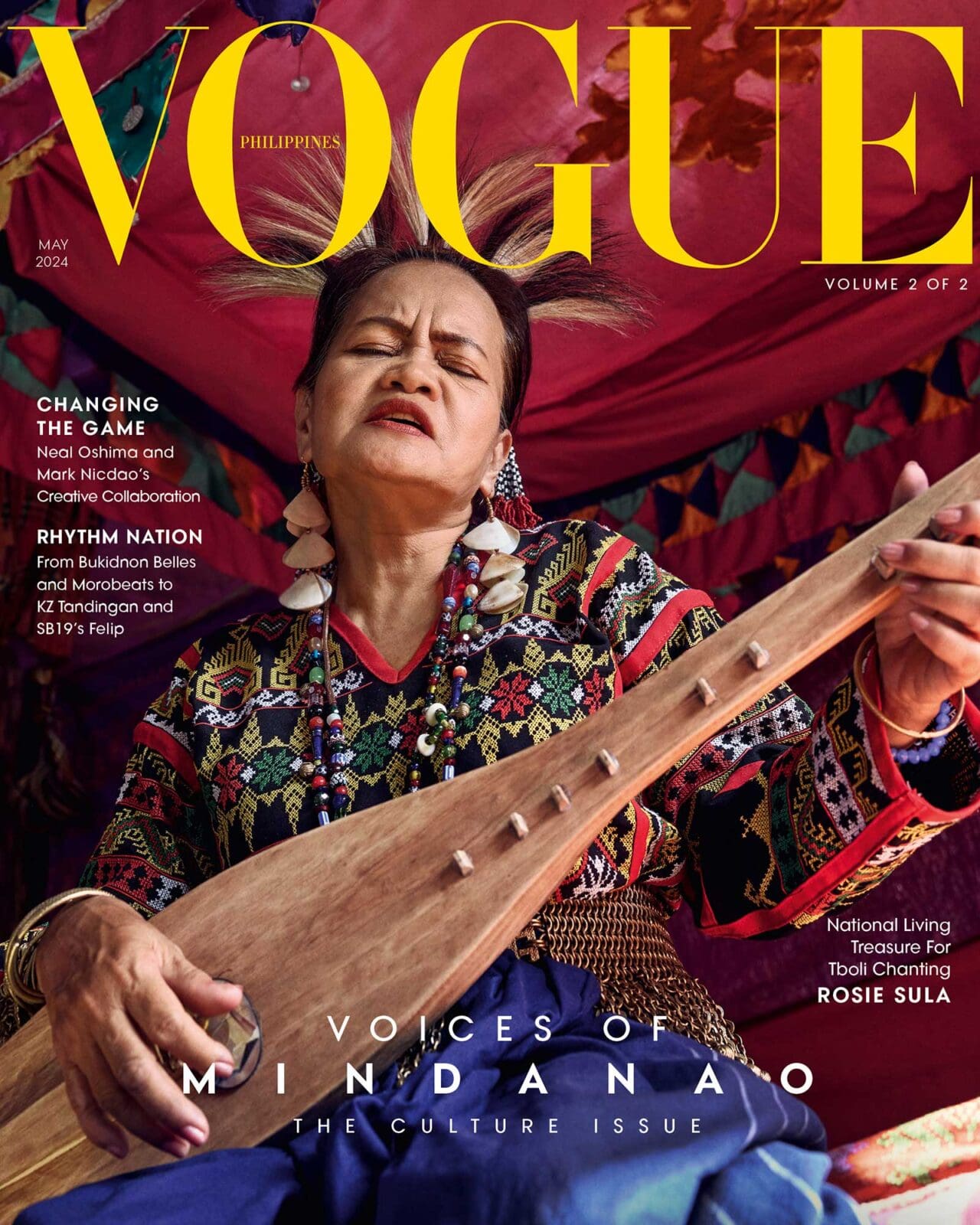Styling by Neil De Guzman. Photographed by Joseph Bermudez for the May 2024 Issue of Vogue Philippines.
Since exploding onto the scene after a viral audition, KZ Tandingan has found both a voice and uses it to speak her truth and lead the way for others.
The first time that most of the country took notice of KZ Tandingan, she shared the story of losing her voice and then finding it.
It was more than a decade ago, on one of the audition stops of the first season of the now defunct show X-Factor Philippines. She just turned 20, and tended toward pairing comfortable-looking kicks and dresses with her wild and wavy hair. In the video packet that prefaced her time on stage, she spoke of suddenly not being able to hit the notes she used to in high school, prompting a change of track. “Meron akong style ngayon na hindi ko naman talaga alam yung exact name ng genre,” she said then. “I make it a point that pag kinanta ko, people will remember it for my style.”
What a style it was. She scatted and made runs with Judy Garland’s “Somewhere Over the Rainbow,” and then rapped in Filipino in her own version of the Fugees’ “Ready Or Not.” The whole room, including the flabbergasted judges, seemed to lose its collective mind, erupting in cheers and dancing. “Davao del Sur, sa inyo ito,” Gary Valenciano, who was part of the panel, told the crowd, pointing at Tandingan. “A star is born in Digos,” fellow judge Martin Nievera added over the screams.
In the years since her viral audition, Tandingan has gotten more than a few awards, sold out concerts here and abroad, sang alongside the likes of Jessie J, and picked up a moniker or two, including “Asia’s Soul Supreme.” Her layered take on “Rolling in the Deep,” far removed from Adele’s original version, has garnered around 24 million views on YouTube and spurred an international fanbase. But, while the 32-year-old now sports a short bright blue ’do and polished threads, she will always be a child of Mindanao.
The artist says it was fun growing up in Digos, Davao del Sur’s capital, which sits on the southern foothills of Mount Apo and by the Davao Gulf. “It’s such a small city, so parang you know people who know people who know people,” Tandingan tells Vogue Philippines, adding that it’s especially true for her father Tex, who she describes as a politician by heart. They didn’t grow up wealthy, but her parents never made them feel that they lacked anything.“They’ve always been very supportive of our passion,” she shares. “I grew up in a very happy home, a music-filled home.”
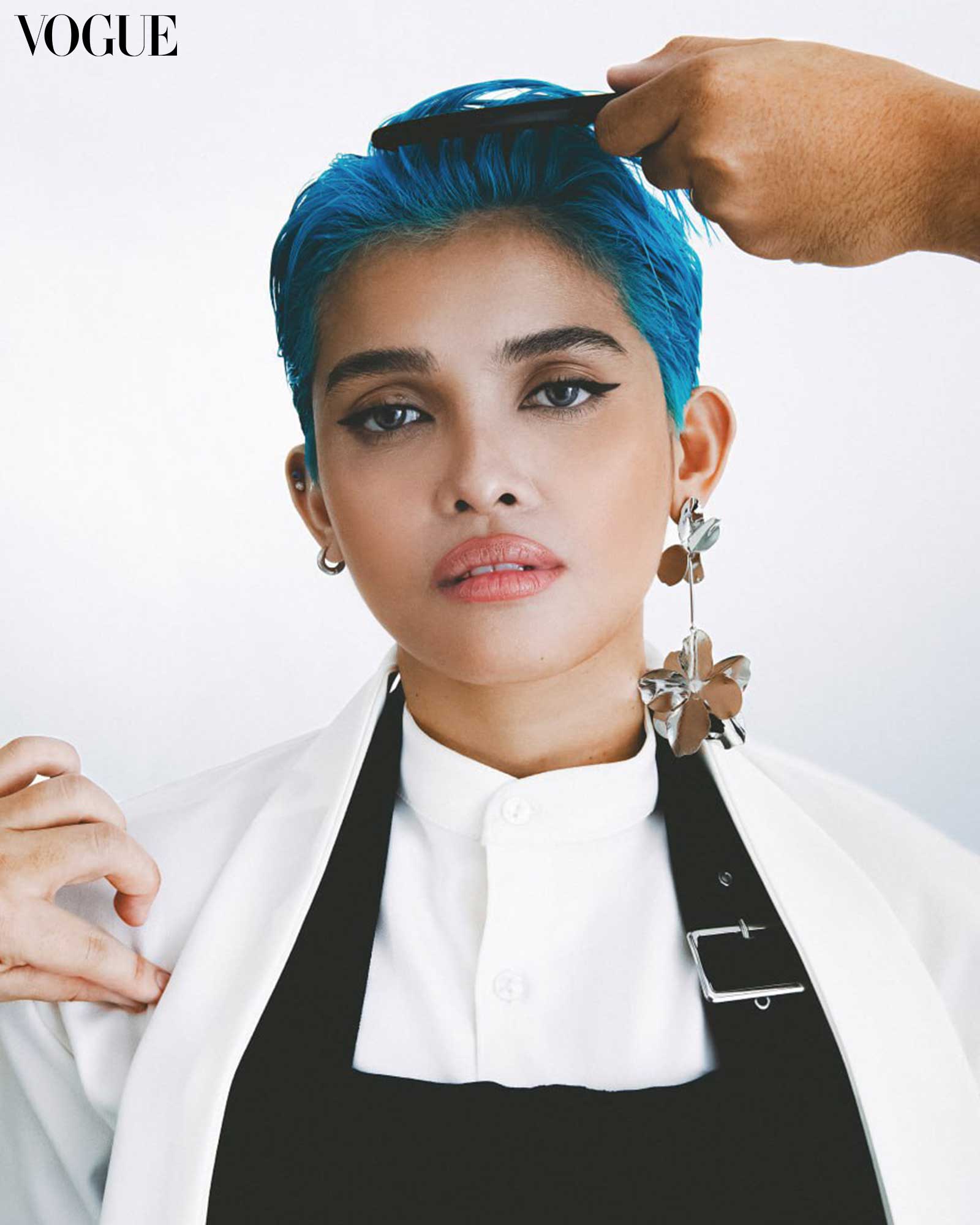
Her dad would sing in bands, and idolized Freddie Mercury. Whenever he would sing to KZ’s mom Marites at karaoke, she would see how she would light up. “Siguro din, naramdaman ko na [Maybe, I felt that], I want to be like that, I want to be able to make people happy through music,” the artist says. As young as three years old, the older Tandingan told the younger that he saw potential in her, and he made it his life’s mission to teach and push her to go for opportunities to perform in front of a crowd, whether it’s school competitions or barangay functions. She ended up loving to perform.
“In the province pursuing music isn’t really considered a career that will pay for whatever your family will need,” KZ shares. That’s why, she says, her father set aside his music dream and focused on becoming an engineer. But when he saw that spark, that love for music in his daughter, “siguro, in a way, tinuloy niyang i-chase ’yung pangarap niya through me [maybe, in a way, he chased his dreams through me].” She even admits that, for a time, she found it hard to sing without Tex around. Whenever she would get overwhelmed, like during a performance, she would just focus on him.
But feeling the rebelliousness and invincibility of youth then, the artist shares that she didn’t properly manage her instrument growing up. “Parang kahit na anong sabi sakin ng tatay ko na kung paano dapat alagaan yung boses ko, matigas talaga yung ulo ko [Whatever my dad says how to take care of my voice, I was just stubborn about it],” Tandingan shares. She only saw the consequences of her hardheadedness when it manifested physically, first in her father. In her second year of high school, doctors found a large polyp in Tex, requiring surgery. It was a struggle for him to talk and his voice changed.
Vocal chord polyps are growths that usually stem from overuse, making jobs that require a lot of talking, shouting, and singing susceptible to them. While non-cancerous, they cause the voice to become hoarse and raspy, and to break. Seeing all these symptoms in her dad made KZ realize that she had the same signs. When she was starting out and she would lose her voice, she would just rest for a day and she’ll be back to 100 percent, but it got to a point when it wouldn’t come back even after a week. “Medyo matagal-tagal na rin po akong nahihirapan kumanta.
Kasi for a time, I was also in denial na pinagdadaanan ko ’yun,” KZ shares. Eventually, she told her parents and had herself checked, and confirmed that she too had polyps. It wasn’t as severe as her father’s, but she still had to take steroids.
Her voice, however, never went back to what it was. And, in a country that prizes big belters, she found it frustrating to not be able to hit the same notes she used to. “I almost gave up singing,” the Davaoeña admits, and she focused on other things like dancing and her studies.
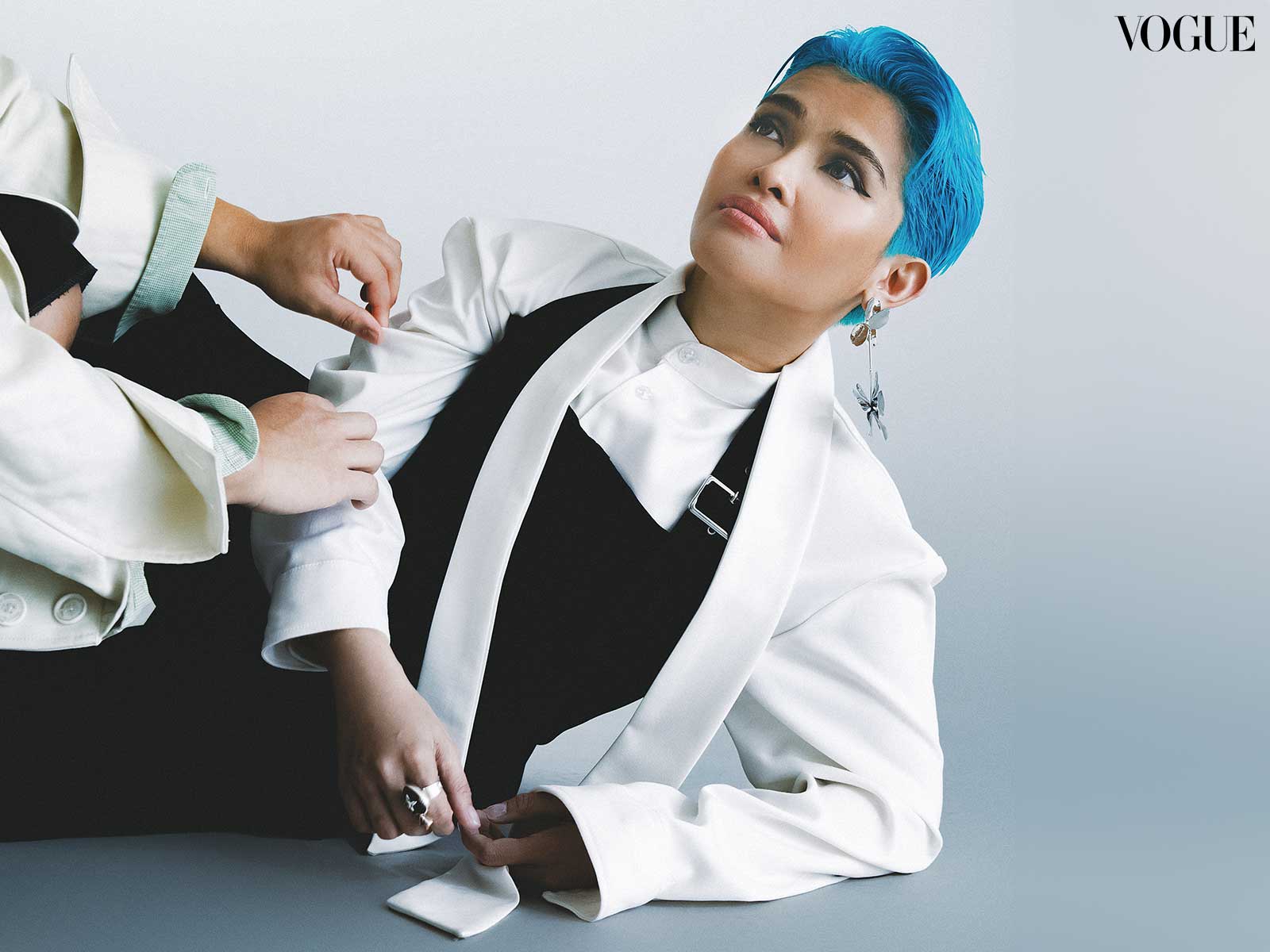
During that time, acoustic music was starting to trend, and, through her classmates, KZ discovered a different sound. She realized that she didn’t have to hit big notes to tell a story effectively, and that there is something enthralling in the softness, in texture and unique complexity.
“Little by little I found my way back to music,” she shares, adding that she discovered other artists to widen her musical perspective even more. It was challenging and took a lot of trial and error and artist recommendations from friends, but she says that she found her sound. “I found the thing that I wanted to do because I couldn’t do what was supposed to be done normally sa isang singer,” she continues. “Napilitan akong maghanap kung saan ako papunta. Yun nga parang whatever I do now, parang kung paano ko man siya ginagawa, it’s actually a culmination of all the different genres I’ve listened to for 30 years and the different artists I’ve met along the way.”
Among those KZ had met on her musical path, of course, are ones who are also from Mindanao. It’s rare for big opportunities to make it down south, she says. When she joined X-Factor, not many even knew where her hometown was. “Whenever I’m asked, ‘Taga-saan ka?’ Kapag sinabi kong Digos, it’s going to be an entire conversation na kulang na lang ipakita ko sa mapa para makita nila [Whenever I’m asked ‘where are you from,’ If I say Digos, it’s going to be an entire conversation that I feel that I have to show it on a map],” she shares.
When it comes to songwriting, KZ hopes that there will be more representation. Most of her songs are either English or Tagalog, but there are many beautiful stories in Bisaya that another language cannot give justice to fully. She emphasizes that we should not restrict ourselves just because we do not readily understand the lyrics. “Sometimes when we write in Bisaya, people would always ask us to make a Tagalog version, a Filipino version or an English version, but dili e [No]. The humor is not the same. It doesn’t feel the same.”
While it’s going to be challenging for a Mindanaoan to make a name for his or herself and to push for more representation in the industry, KZ says, the “victory is sweeter because it is beyond ourselves. It is not just your own victory, but the victory of the place you represent, the victory of Mindanaoans.” She hopes that she and other Mindanaon success stories can “swing these gates wider for more and more artists pa.”
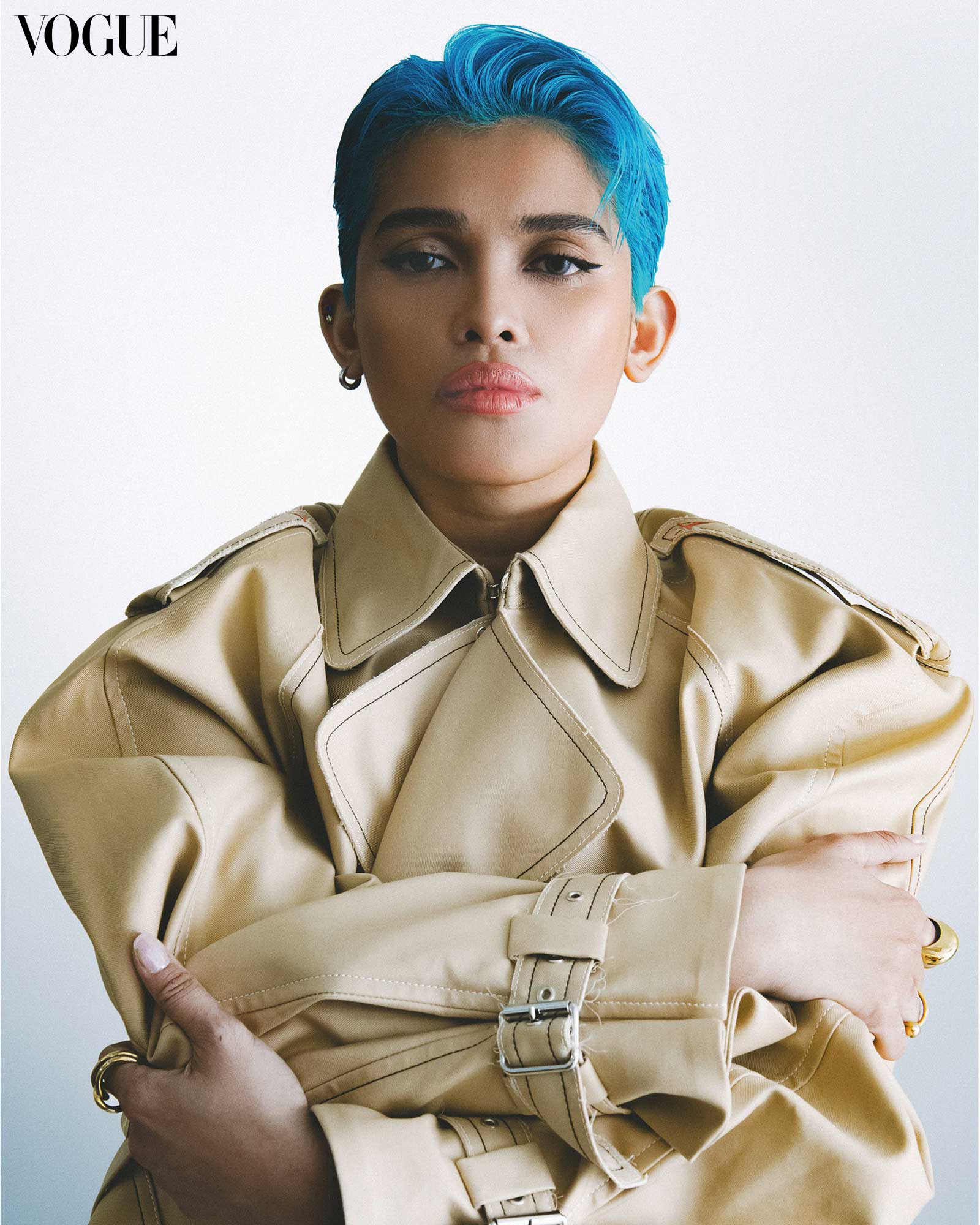
Her music is a stark contrast to the warmth and lightness of her persona. “I find that I am most effective as a singer and interpreter when the song talks about something dark, or talks about a heartbreak, or talks about parang pain,” KZ explains.
Tonally, that aching weight, that almost guttural intensity naturally go with the topics of complicated situations, loss, and tough decisions she regularly sings about. These might not be to everyone’s liking. “I’m still working on it. I’m still working on finding the balance that people still get it, but, at the same time, it’s the truth of who I am.”
KZ admits that it’s “hard to inspire people when you know yourself that you don’t feel inspired because you’re going through something.” She emphasizes the importance of having people around who are still going to choose to love you even when you go through the dark moments, when, she says, you feel you are “the most unlovable person.” She appreciates that everytime she and her husband (fellow musical artist and Davaoeño TJ Monterde) talk about mental health, it’s not dismissed. “I grew up in a Christian family, so people would say ‘Just pray about it,’ which is not a bad thing, but it’s also something very real. So when I get to talk about it, whatever I’m going through, nagkakaroon din po ako ng kaagapay ba [I have someone who helps me through it], na I’m not carrying whatever burden it is alone,” she explains. “It’s a process for me. I had to pray about it, and really accept that I need help.”
She feels that the industry’s hardships are worth it, that she must be doing something right, whenever someone comes up to tell her “Your music got me through this really bad situation. You remind me to love myself. You remind me to be true to who you are.” It’s easy to forget who you are in the music industry, KZ shares, because you’re forced into a box. “Don’t allow yourself to stay in the box because you’re meant to display your craft, display your art, display your feelings to the world,” the artist says. “That’s the only way for you to really find your voice is to not listen to other people, but to listen to yourself.”
What matters to KZ is that her performances mark her audiences. When they go home and are alone in their rooms, the feeling, the experience lingers. “You’re not just singing it as a singer, you’re taking the people with you on that journey,” she says. That it was more than just hearing the voice she found, but that she opened your hearts and made you listen to her story.
By JACS T. SAMPAYAN. Photographs by JOSEPH BERMUDEZ. Beauty Editor: JOYCE OREÑA. Styling by NEIL DE GUZMAN. Makeup: Mac Igarta. Hair: Mark Familara. Art Direction: Tinkerbell Poblete. Producer: Anz Hizon. Nails: Extraordinail. Beauty Writer: Bianca Custodio. Production Assistant: Bianca Zaragoza. Photographer’s Assistant: Rojan Maguyon. Stylist’s Assistant: Ticia Almazan.
